1. Sung H, Ferlay J, Siegel RL, Laversanne M, Soerjomataram I, Jemal A, et al. Global cancer statistics 2020: GLOBOCAN estimates of incidence and mortality worldwide for 36 cancers in 185 countries. CA Cancer J Clin. 2021; 71:209–249. PMID:
33538338.
2. Kang MJ, Won YJ, Lee JJ, Jung KW, Kim HJ, Kong HJ, et al. Cancer statistics in Korea: incidence, mortality, survival, and prevalence in 2019. Cancer Res Treat. 2022; 54:330–344. PMID:
35313102.
3. Hong YS, Jung EJ, Ryu CG, Kim GM, Kim SR, Hong SN, et al. Incidence and multiplicities of adenomatous polyps in TNM stage I colorectal cancer in Korea. J Korean Soc Coloproctol. 2012; 28:213–218. PMID:
22993708.
4. Lee BI, Hong SP, Kim SE, Kim SH, Kim HS, Hong SN, et al. Korean guidelines for colorectal cancer screening and polyp detection. Korean J Gastroenterol. 2012; 59:65–84. PMID:
22387833.
5. Mansouri D, Powell AG, Park JH, McMillan DC, Horgan PG. Long-term follow-up of patients undergoing resection of TNM stage I colorectal cancer: an analysis of tumour and host determinants of outcome. World J Surg. 2016; 40:1485–1491. PMID:
26920405.
6. Benson AB, Venook AP, Al-Hawary MM, Arain MA, Chen YJ, Ciombor KK, et al. Colon cancer, version 2.2021, NCCN clinical practice guidelines in oncology. J Natl Compr Canc Netw. 2021; 19:329–359. PMID:
33724754.
7. Sun D, Chen J, Liu L, Zhao G, Dong P, Wu B, et al. Establishment of a 12-gene expression signature to predict colon cancer prognosis. PeerJ. 2018; 6:e4942. PMID:
29915691.
8. Van Blarigan EL, Meyerhardt JA. Role of physical activity and diet after colorectal cancer diagnosis. J Clin Oncol. 2015; 33:1825–1834. PMID:
25918293.
9. Keum MA, Lim SB, Kim SA, Yoon YS, Kim CW, Yu CS, et al. Clinicopathologic factors affecting recurrence after curative surgery for stage I colorectal cancer. J Korean Soc Coloproctol. 2012; 28:49–55. PMID:
22413082.
10. Lee JH, Lee JL, Kim JC. Identification of recurrence-predictive indicators in stage I colorectal cancer: reply. World J Surg. 2017; 41:1658–1659. PMID:
28321557.
11. Kang SI, Kim DW, Kwak Y, Lee HS, Kim MH, Kim MJ, et al. The prognostic implications of primary tumor location on recurrence in early-stage colorectal cancer with no associated risk factors. Int J Colorectal Dis. 2018; 33:719–726. PMID:
29594445.
12. Gilardoni E, Bernasconi DP, Poli S, Garancini M, Luperto M, Zucchini N, et al. Surveillance for early stages of colon cancer: potentials for optimizing follow-up protocols. World J Surg Oncol. 2015; 13:260. PMID:
26311420.
13. Leijssen LG, Dinaux AM, Kinutake H, Bordeianou LG, Berger DL. Do stage I colorectal cancers with lymphatic invasion require a different postoperative approach? J Gastrointest Surg. 2019; 23:1884–1892. PMID:
30511134.
14. Huh JW, Kim CH, Kim HR, Kim YJ. Oncologic outcomes of pathologic stage I lower rectal cancer with or without preoperative chemoradiotherapy: are they comparable? Surgery. 2011; 150:980–984. PMID:
21875732.
15. Kim C, Kim WR, Kim KY, Chon HJ, Beom SH, Kim H, et al. Predictive nomogram for recurrence of stage I colorectal cancer after curative resection. Clin Colorectal Cancer. 2018; 17:e513–e518. PMID:
29661621.
16. Zhang XM, Ma C, Sun DY, Wang Z, Zhou ZX. Analysis of the prognostic factors for low rectal cancer with the pT1-2NxM0 stage after abdominoperineal resection. Eur J Gastroenterol Hepatol. 2015; 27:24–28. PMID:
25426977.
17. Veereman G, Vlayen J, Robays J, Fairon N, Stordeur S, Rolfo C, et al. Systematic review and meta-analysis of local resection or transanal endoscopic microsurgery versus radical resection in stage I rectal cancer: a real standard? Crit Rev Oncol Hematol. 2017; 114:43–52. PMID:
28477746.
18. Peng J, Chen W, Venook AP, Sheng W, Xu Y, Guan Z, et al. Long-term outcome of early-stage rectal cancer undergoing standard resection and local excision. Clin Colorectal Cancer. 2011; 10:37–41. PMID:
21609934.
19. Käser SA, Froelicher J, Li Q, Müller S, Metzger U, Castiglione M, et al. Adenocarcinomas of the upper third of the rectum and the rectosigmoid junction seem to have similar prognosis as colon cancers even without radiotherapy, SAKK 40/87. Langenbecks Arch Surg. 2015; 400:675–682. PMID:
25163656.
20. Xu B, Yu L, Zhao LZ, Ma DW. Prognostic factors in the patients with T2N0M0 colorectal cancer. World J Surg Oncol. 2016; 14:76. PMID:
26965721.
21. Teloken PE, Ransom D, Faragher I, Jones I, Gibbs P, Platell C. Recurrence in patients with stage I colorectal cancer. ANZ J Surg. 2016; 86:49–53. PMID:
26235683.
22. Guraya SY. Pattern, stage, and time of recurrent colorectal cancer after curative surgery. Clin Colorectal Cancer. 2019; 18:e223–e228. PMID:
30792036.
23. Kaiser AM, Kang JC, Chan LS, Beart RW. The prognostic impact of the time interval to recurrence for the mortality in recurrent colorectal cancer. Colorectal Dis. 2006; 8:696–703. PMID:
16970581.
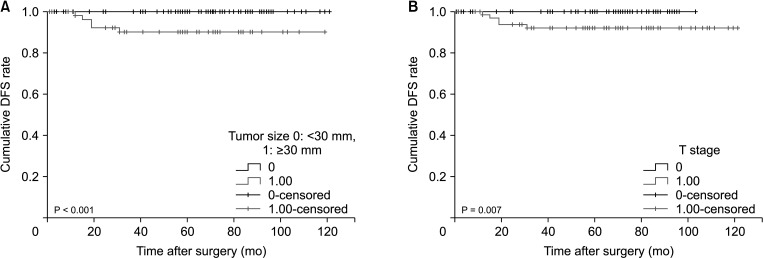
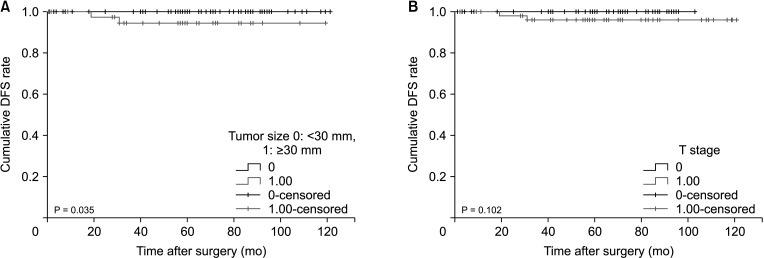
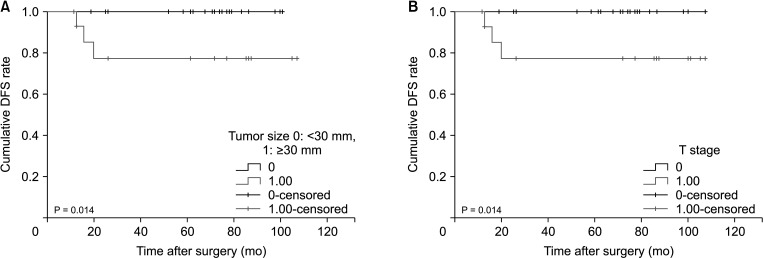




 PDF
PDF Citation
Citation Print
Print



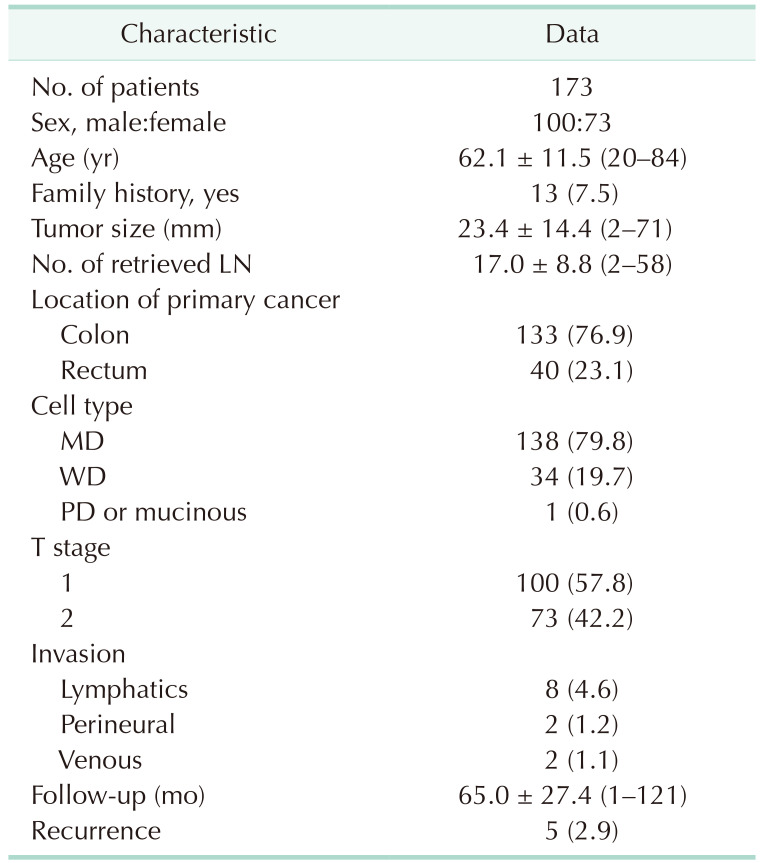
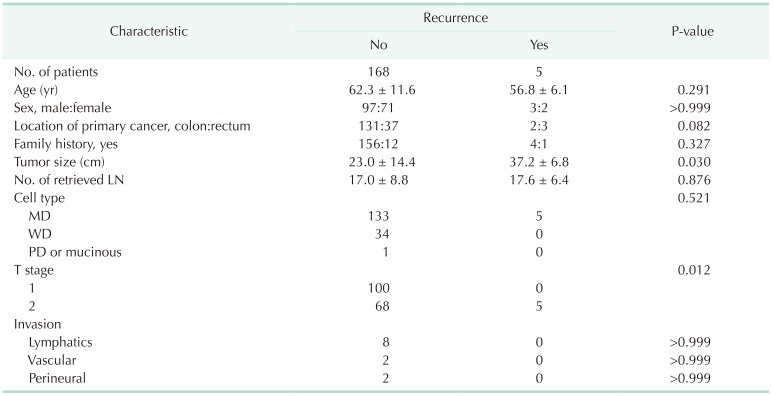
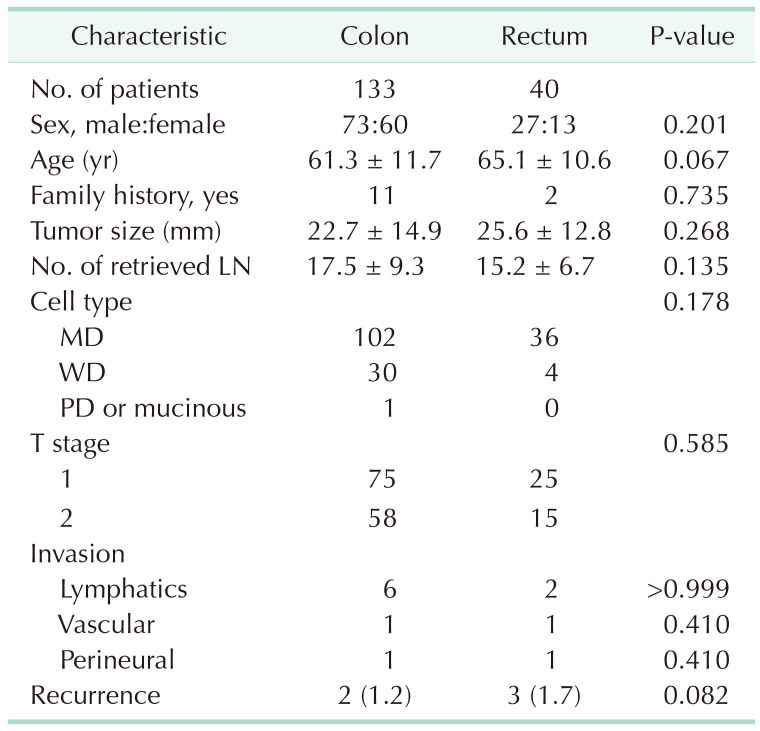
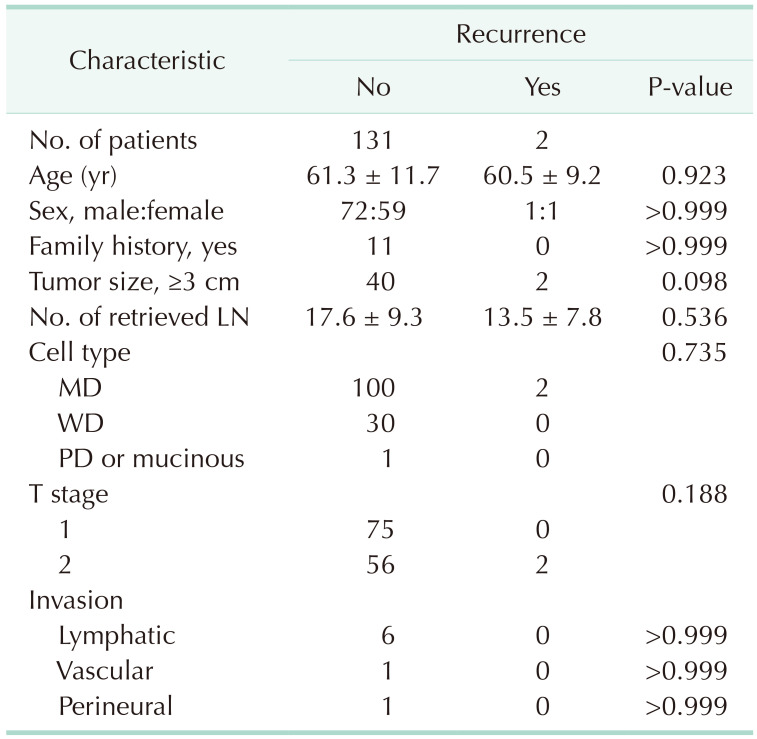
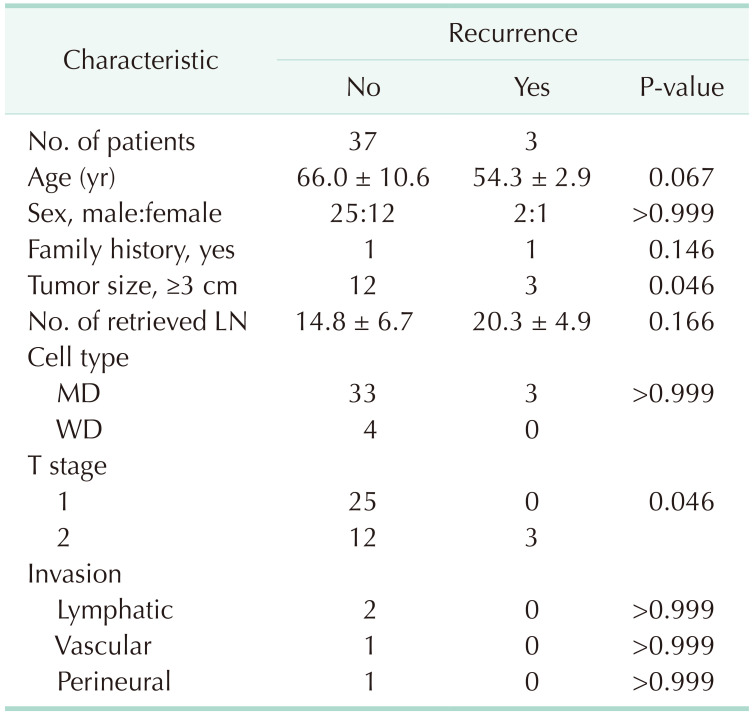

 XML Download
XML Download